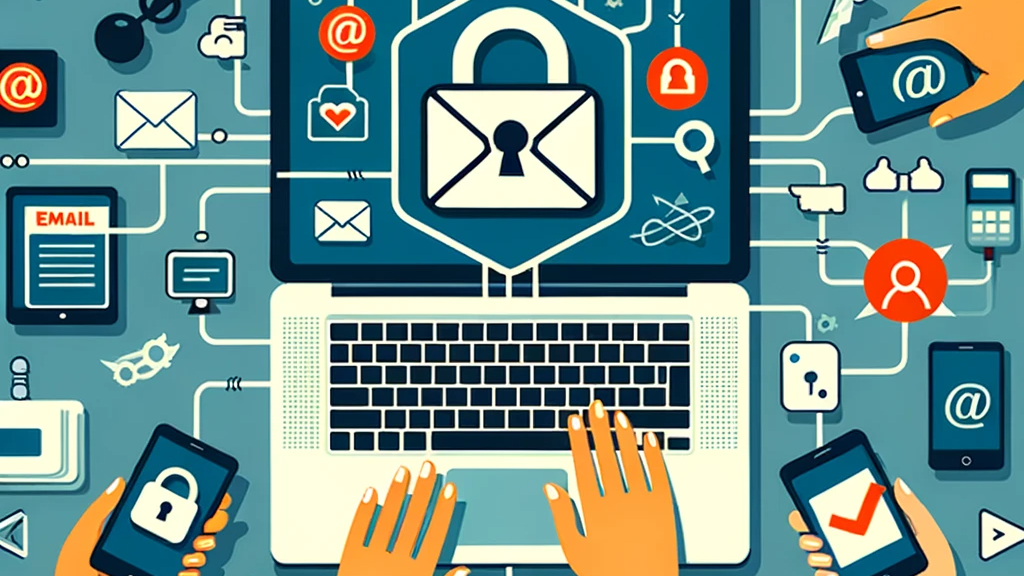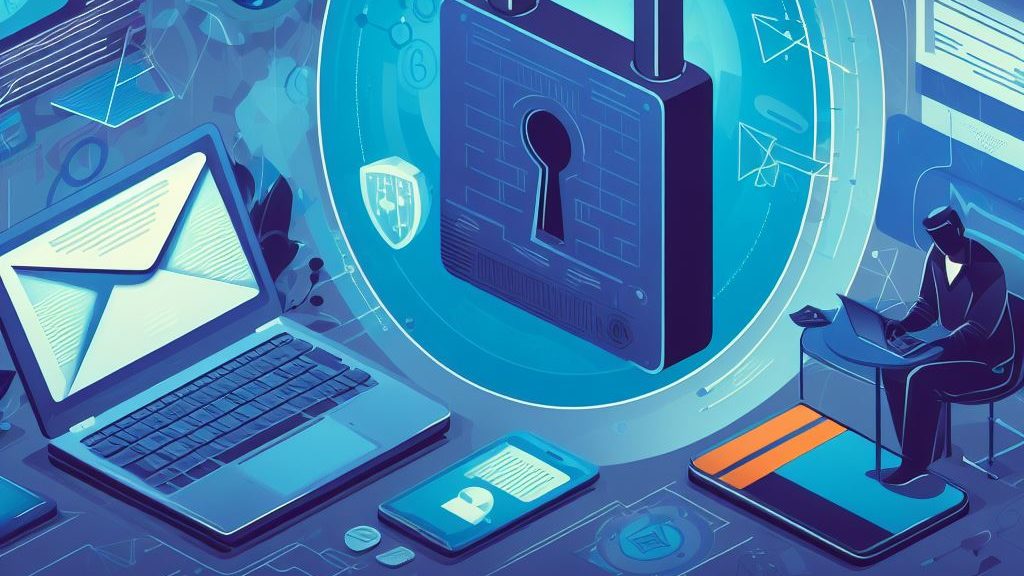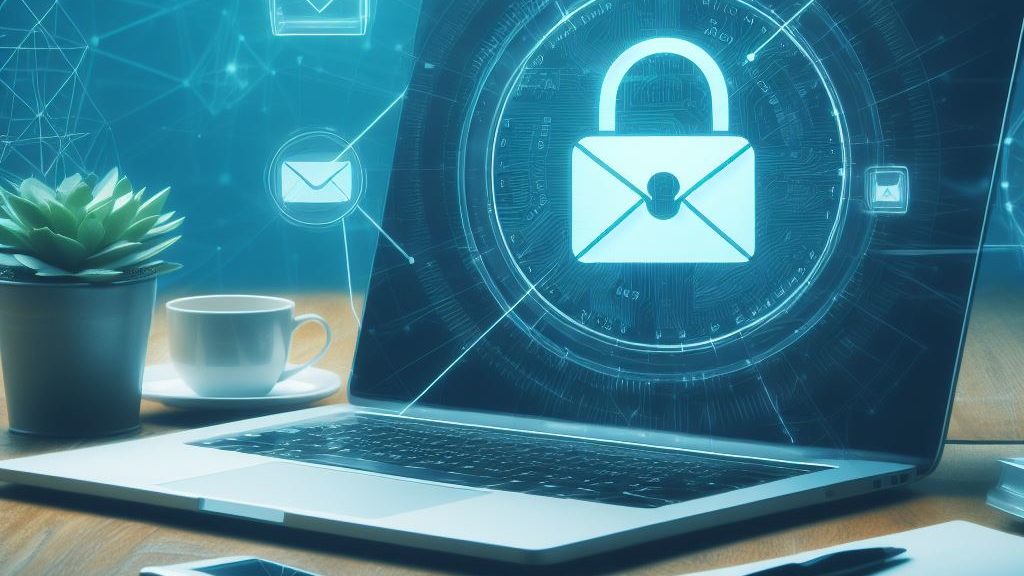Stephen Wagner | Writer, Editor, Marketer
About This Article
I wrote this piece of content to help people make informed decisions about their email privacy. This is a topic I’m passionate about.

A Quick Guide to the Best Encrypted Email in 2023
Chances are, your email isn’t as private as you think. Here’s how to change that.
Introduction: Your Data Privacy Matters
If you’re like most people, your email inbox lives on your smartphone and travels everywhere you do. It’s full of messages about family, shopping, doctor appointments, school, and work. While you’re not deeply concerned about people seeing it, you still wouldn’t let a stranger snoop around inside. But if you’re one of the billions of people who use popular free email providers, that’s exactly what happens.
To paraphrase an old saying, “if you don’t pay for the product, you are the product.” In the world of email, this is especially true. Companies like Google and Microsoft have full access to your inbox, scanning messages for purposes of advertising, saving your purchase history, pushing notifications, searching for malware, and generating A.I. responses. They profit from your data. Nothing is private.
The solution is encryption, which is a high-tech way to scramble data so that it’s unreadable to anyone without a key. With encrypted email, you hold the key to your inbox and your email provider can’t read its contents. You might have heard names like Proton Mail and Tutanota in passing; these are just two of a growing number of companies offering encrypted email service. In this guide, we’ll examine popular choices for the best encrypted email in 2023, touching on the pros and cons of each. By the end, you’ll be well-equipped to make smart choices about your inbox.
Why Use Encrypted Email?
First, it’s important to distinguish between privacy and security. Privacy means that your emails are only accessible to people you allow to see them. When you send a message to your friend, you know she will read it. However, you don’t expect her to share it with her friends and family. If your friend is passing around sensitive messages, she is violating your privacy. Meanwhile, security means that your inbox is safe from being accessed through nefarious means like hacking and malware. A secure email provider has safeguards in place to mitigate these threats.
Any email provider you consider should have high security standards. For this discussion, we’ll focus on privacy, since that’s a rarer feature. With that in mind, here are some reasons to use encrypted email:
- Privacy Concerns: Privacy is a luxury rather than a right. Emails hold sensitive data of all kinds, from your personal correspondence and photos to critical business documents and financial records. Using an encrypted email service keeps this data locked away from the prying eyes of hackers, corporate advertisers, and surveillance agencies.
- Data Breaches: Every year, millions of people are affected by data breaches. These events involve mass exposure of sensitive data, which leaves users vulnerable to hacking and identity theft. Encrypted emails act as your last line of defense in such scenarios, making your data unreadable to unauthorized users even if they access it.
- Legal Requirements: Certain industries, such as healthcare, legal services, and finance, have strict regulations that require secure data handling. These regulations, like the U.S.’s Health Insurance Portability and Accountability Act (HIPAA) or the EU’s General Data Protection Regulation (GDPR), impose severe penalties for non-compliance. Using encrypted email services is often a basic requirement to meet these standards.
What to Consider When Choosing an Encrypted Email Provider
There are dozens of features to consider in your search for the best encrypted email in 2023. No two providers are quite the same, nor are any two customers. However, the following features are important to most people, and therefore, a wise place to start.
- Encryption Techniques: It’s critical to understand the specific encryption used by the email provider. End-to-end encryption (E2EE) is the gold standard, ensuring that only the sender and recipient can decrypt and read the email. With E2EE, your messages are encrypted before they leave your device and remain so until they arrive at their destination. Some providers also offer additional features like two-factor authentication and digital signatures for enhanced security. Keep in mind that, unless the recipient uses an encrypted email provider, your sent emails will be stored un-encrypted in their inbox.
- User Experience: The ideal encrypted email service should offer a user-friendly interface that does not compromise on security features. An intuitive design allows for easy navigation, smooth operation, and a positive overall user experience. If the UX is friction-free, you’ll be more likely to continue using it, thus keeping you safer and private for longer.
- Storage Capacity: Every user has different needs when it comes to email storage, so this is up to preference. While personal users might need minimal storage, businesses and professionals may require extensive space for email archives. It’s essential to examine the storage options offered by providers, as this can be a deciding factor.
- Pricing: As with most services, email encryption services come with tiered pricing plans. While some providers offer robust free plans, most require a subscription for premium features like increased storage and custom domains. Always weigh the features against your budget to make an informed choice.

Popular Encrypted Email Providers in 2023
Proton Mail
Based in Switzerland, a country renowned for its privacy-friendly laws, Proton Mail was founded by scientists from CERN (the European Organization for Nuclear Research) in 2014. The company’s mission is to provide secure and private communication for everyone, making it a popular choice for activists, journalists, and businesses concerned about data privacy. It offers a modern interface and a suite of optional tools like a calendar, VPN, and cloud file storage. Proton’s free plan is adequate for casual use, and the premium plans start at $5 per month.
Key Features
- End-to-end encryption
- Self-destructing messages
- Custom domains
- Business features
- Tor support
- Based in Switzerland
Pros and Cons
- Pros: Exceptionally secure; fully open-source; robust free plan; mature company with a history of respecting its customers’ privacy
- Cons: Mobile apps lack some features of the web interface; inconsistend development timeline for new features
Who Should Use Proton Mail?
Proton Mail is an excellent choice if you want strong encryption, convenient features, and an attractive user interface hosted by a reputable company in a country with strong privacy laws. Proton is popular for good reason.
Tutanota
Tutanota is a German-based service founded in 2011 that provides encrypted email to users worldwide. The company was founded with the goal of creating an email service that lets users reclaim control of their data. This makes it an ideal solution for individuals who require secure email. Unlike many of its competitors, Tutanota encrypts subject lines. While its interface is basic by modern standards, the service is inexpensive: the premium plan starts at around $4 per month.
Key Features
- End-to-end encryption
- Open source
- Custom domains
- Encrypted search
- Business features
Pros and Cons
- Pros: Robust encryption; encrypted subject lines; supports a wide range of platforms
- Cons: Bare-bones interface; limited third-party integration; the free plan is somewhat restricted
Who Should Use Tutanota?
Tutanota is a great choice if you want inexpensive yet private email and calendar and you don’t mind a minimalist web interface and mobile app. That said, if you expect to bundle other encrypted services, you might want to look elsewhere.
Hushmail
An encrypted email industry veteran, Hushmail has been in operation since 1999. This Canadian-based service aims to provide user-friendly yet powerful encrypted email solutions to a broad range of users, from individual consumers to healthcare providers. While it’s positioned as a business platform, it also offers a stripped-down personal plan for an annual lump sum of $50 (less than $5 per month).
Key Features
- End-to-end encryption
- Built-in secure web forms
- HIPAA compliance options
- Custom domains
- Specific plans for healthcare companies and law firms
Pros and Cons
- Pros: Established and trusted; industry-specific solutions
- Cons: Interface could be more modern; higher price-to-feature ratio compared to competitors
Who Should Use Hushmail?
Hushmail is a great choice if you need encrypted email, secure web forms, and electronic signatures for your small business, law firm, or healthcare company. For personal use, other providers offer more attractive services.
Mailfence
Mailfence offers robust privacy protections under Belgian law since 1999. The company was founded with the mission of providing a secure and private alternative to other email providers like Gmail and Yahoo. It also offers calendars and document sharing, and the premium plans start at $3.50 per month, billed yearly.
Key Features
- End-to-end encryption
- Two-factor authentication
- Integrated calendar and documents
- Secure file sharing
- Custom domains
- Compatible with any OpenPGP service
Pros and Cons
- Pros: Ability to choose which emails to encrypt; flexible pricing
- Cons: Learning curve for non-tech-savvy individuals; free plan has limited storage
Who Should Use Mailfence?
Mailfence is a good inexpensive option if you want encrypted email and document sharing but you don’t need a lot of storage or other integrated apps.
Zoho Mail
Zoho Mail is a product of Indian company Zoho. It has incorporated S/MIME encryption into its service, targeting professionals and businesses that need a secure but comprehensive suite of office tools. Although it wasn’t initially built as an encrypted email provider when it released in 2008, Zoho Mail has adapted to meet the increasing demand for secure communication. If you currently use Gmail, Zoho might offer the most similar interface. Beyond email, the company also offers dozens of tools for productivity and business functions. The basic premium email plan costs only $1 per user per month.
Key Features
- S/MIME encryption
- Business app integration
- Advanced search and filters
- Custom domains
- Enterprise-level administration controls
Pros and Cons
- Pros: A robust suite of productivity tools; enterprise-level features; modern mobile and web apps; free plan offers one custom domain
- Cons: The parent company is not specialized in privacy; can have a steep learning curve
Who Should Use Zoho Mail?
Zoho Mail is a great choice for anyone who requires an expansive suite of integrated tools for running a business. It’s also an inexpensive choice for personal users who want to dip their toes into the world of encrypted email.
Skiff Mail
A relative newcomer to the world of encrypted email, Skiff Mail was founded in 2020. The company is rapidly gaining ground with its private email, calendar, file storage, and document editing apps. Based in the United States, Skiff targets personal and small business customers with a modern user experience and promises of strong privacy protections. All pricing tiers include the full suite of apps, and the basic plan costs $3 per month.
Key Features
- End-to-end encryption
- Custom domains
- Unlimited aliases
- Open source
- Team collaboration
- Encrypted document sharing
Pros and Cons
- Pros: Modern interface; integrated calendar and documentdocuments; inexpensive; free plan offers one custom domain
- Cons: Young company with short track record; United States has weaker privacy laws than some other countries
Who Should Use Skiff Mail?
Skiff Mail is a strong choice if you’re looking for a modern encrypted email and document experience at little cost. While the company is young, it has innovated quickly.

Encrypted Email Feature Comparison
This table offers a convenient overview of popular features offered by the encrypted email providers we discussed.
| Feature | Proton Mail | Tutanota | Hushmail | Mailfence | Zoho Mail | Skiff Mail |
|---|---|---|---|---|---|---|
| End-to-end encryption | Yes | Yes | Yes | Yes | Yes | Yes |
| Free plan | Yes | Yes | No | Yes | Yes | Yes |
| Basic paid plan (monthly) | $4.99 | $4.00 | $4.17 | $3.50 | $1 | $3 |
| Storage | 500 MB – 500 GB | 1–500 GB | 10 GB | 1–225 GB | 5–50 GB | 10 GB – 1 TB |
| Calendar | Yes | Yes | No | Yes | Yes | Yes |
| Custom domains | Yes (paid) | Yes (paid) | Yes (paid) | Yes (paid) | Yes | Yes |
| Business plan | Yes | Yes | Yes | Yes | Yes | Yes |
| Location | Switzerland | Germany | Canada | Belgium | United States | United States |
| Best for | Personal | Personal | Business | Personal & Business | Personal & business | Personal |
How to Switch to an Encrypted Email Provider
Transitioning to an encrypted email provider is easy enough, though it requires patience and forward thinking. The process can usually be completed in a few straightforward steps.
- Assess your requirements: Take stock of your specific needs — be it storage capacity, multiple user accounts, or the country where your email is hosted. Ask yourself what’s most important. For example, are you willing to trade a modern interface for more features?
- Choose providers: Use the information in this guide to shortlist and select the email service that meets your needs. If it’s a close call, there’s no harm in choosing two or three and making free accounts with each.
- Sign up and configure: You’ll need to complete a simple sign-up process. Make sure to set strong, unique passwords and enable two-factor authentication if available.
- Migrate old emails: Most services offer easy ways to import your emails and contacts — sometimes with just a few clicks. Make sure to complete this step if keeping your old emails is important. (If you’re testing multiple services, consider waiting until you’ve made your final choice, as migrating can be time-consuming.)
- Test thoroughly: Before making a complete transition, run tests to ensure the new service is user-friendly. Send emails to yourself and other people, create privacy aliases, set up filters, and test organization features like folders and labels.
If you want to future-proof your email, here’s a tip: register a custom domain to use instead of the domain assigned by your email provider. (For example, you could use john@smith.com instead of johnsmith@gmail.com.) While this process is complicated, it allows you to change email providers and keep the same address. That way, if you’re dissatisfied with one service, you can switch to another without interruption. Custom domains are a separate discussion, so search online for guides.
Conclusion: The Best Encrypted Email in 2023 is Up to You
Choosing the best encrypted email in 2023 is more than a simple technological decision; it’s a commitment to protecting your data privacy. We’ve discussed how and why you should walk the path of encryption, and we’ve explored several popular solutions. Will you opt for Swiss security or German simplicity? A wealth of features or a focused inbox? The choice is yours, and there’s no wrong answer. So take a deep breath and start clicking. A better future for your email awaits.